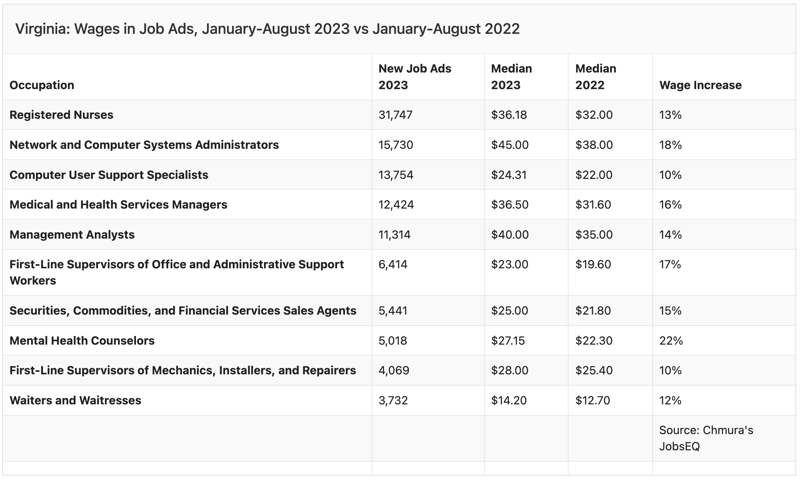Economic Impact: Job postings slowdown not a sign of recession; sign-on bonuses drop

This article was originally published in the Richmond Times Dispatch on September 25, 2023.
Many economists have downgraded the probability of a recession occurring over the next year. They argue that consumer spending remains strong and federal infrastructure spending will continue to support growth.
Job postings, however, seem to be telling a different story. Job postings are a good indicator to watch because they are updated daily and are a leading indicator of employment trends because businesses don’t post job ads unless they expect demand for their goods and services to continue to increase.
Job postings in the United States peaked during the week of June 27, 2022 at 7.1 million and have since fallen 17% to 5.9 million during the week of September 10, 2023. The decline in job postings in Virginia over the same period has been a smaller 10% from 263,724 posts in the week of June 27, 2022 to 236,796 posts most recently.
Over the past year, the drop in job posts in Virginia has continued to show less weakness than in the nation—down 5% compared with 10%, respectively.
In the Commonwealth, job ads for both white-collar and blue-collar jobs each dropped 5% over the past year while ads for service jobs dropped 7%. In the nation, however, white-collar job ads dropped a much larger 22% over the last year compared with a drop of 11% for blue-collar ads and 8% for service jobs. The larger drop in white-collar ads is likely due to layoffs and slower growth among many high-tech firms around the nation.
Even with the decrease in job ads, wages for some occupations are increasing at a much faster pace than inflation. However, sign-on bonuses are not as frequent, which points to some easing in the labor market.
The practice of offering sign-on bonuses in the nation has dropped in a sign that the labor market tightness is easing. About 2% of all new jobs ads in January 2020 explicitly mentioned a sign-on bonus prior to the pandemic. This practice began increasing in popularity in the second half of 2020. It peaked in the fourth quarter of 2021 at 6.0% and has dropped to 3.8% in the second quarter of 2023.
Sign-on bonuses have been and continue to be more popular among blue-collar occupations such as truck drivers. Nearly 13% of all ads in the nation for blue-collar workers mentioned a sign on bonus in the fourth quarter of 2021 and dropped to 5.7% for the second quarter of 2023. This benefit has also dropped among some service and white-collar jobs but the percentages are much lower—from 6.3% to 4.3% for service jobs and 4.0% to 3.3% for white collar jobs.
Just because overall labor market is cooling does not mean that demand for every occupation is weakening.
Prominent occupations in health care and information technology that have been hard to fill have led employers to increase compensation in an attempt to fill these positions. As shown in the table, wages disclosed in job ads for openings in Virginia indicate double-digit percentage increases in pay for some health care jobs (registered nurses, medical and health services managers, and mental health counselors) as well as computer systems administrators and computer user support specialists.
The slowdown in job postings and sign-on bonuses around the nation is pointing toward slower growth, but it’s not yet flashing a recession signal.

Christine Chmura is CEO and chief economist at Chmura Economics & Analytics. She can be reached at (804) 649-3640 or receive e-mail at chris@chmuraecon.com.
Subscribe to the Weekly Economic Update
Subscribe to the Weekly Economic Update and get news delivered straight to your inbox.











